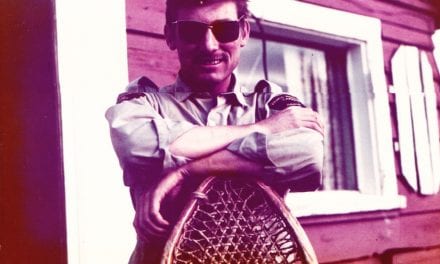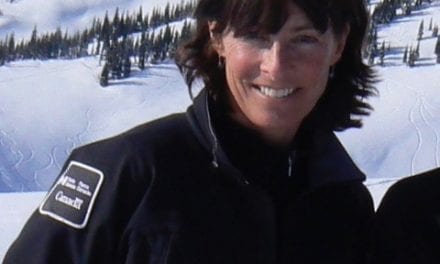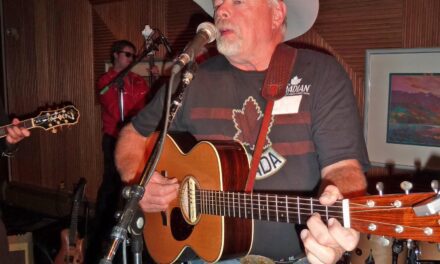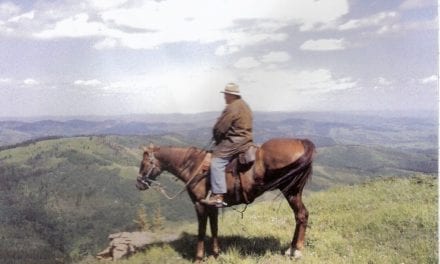“What year was that?”)
1990, I guess. Right after we climbed Mount Steele, for the centennial, the RCMP centennial. My grandfather on my mother’s side was a North West Mounted Policeman. So he worked for Steele who was the head guy for the North West Mounted Police in the north. There is a mountain called Mount Steele and they did the RCMP 100th centennial climb, so I was involved in that.
“After you left the warden service what did you do?”
(49:26) Oh I did odd jobs, guiding and I ran a little lodge outside the road for a while. I had a boat tour on Kathleen Lake here in the park here for six years and that is about it. I am on the boards and committees, different things here and there.
. “And the cultural activities, do you still perform?”)
Every so often, yes.
“Are your children still in the north?”
My youngest lives in Red Deer and my eldest daughter and my son are both in the Yukon, one works for Air North and the other works for the territorial government.
“Is there anything that I haven’t asked you that you would like to add?”
(50:50) Well, I could give you one more rescue that we did which is different.) We were doing rescue practice during the week using helicopters…we had the weekend off sort of thing, but the pilot still had a job to do. He had to move some kayakers through a place called Turnback Canyon, just on the BC/Yukon border. It is a place where a glacier comes right in up against the mountain. It is a terrible place and Turnback is appropriately named, most people will raft down and then fly over Turnback canyon and then continue down beyond that to Dry Bay in Alaska and that is on the Alsek River. This one particular weekend the pilot says, “Well, I am flying down empty and I’m coming back empty…there is a couple going to try and go through (Turnback Canyon), so I am moving their camp over. If you guys want to come?” We had an Alouette helicopter which is a seven passenger helicopter, so three or four of us jumped in… Willi Pfisterer was there, Lloyd Freese and Rick Staley. So we were going down and this has got to do with being involved in rescues, it wasn’t outside of the park per se but it was on the edge of it, and these guys were doing an extremely dangerous thing…We interviewed them before they went down the river because they were going through the park, we interviewed them about what they were doing and where they were going that sort of thing. They were from France and they were going to go through with kayaks, the first time…Well, just on the premise of jumping in (the helicopter), I thought, “Well, they are doing something in the water, it could be dangerous, there could be something happening.” So I threw my wet suit in with me and we had our rescue gear in the helicopter and away we went…We flew down at the bottom of the canyon and we hopped out of the helicopter while he flew out and moved their camp and talked to them. We were standing around there and it was kind of a drizzly day, not the best day to do something like that, but anyway…He flew down and said, “The kayaker had come out of his kayak.” There is a big huge whirlpool just below this one area, a big whirlpool. Well, a couple of us jumped in the helicopter and started up the river just to see what we could do. We had no real plans and we hadn’t trained on it really. We did have a winch and we did have the harnesses with us because we had been doing mountain rescue training. Anyways we realized the guy was out of the kayak, we couldn’t see the kayak anymore and we looked and we looked. It took us quite a while before we finally spotted the kayaker. He had a dark blue outfit on. Nothing stood out and the water in that river is extremely dirty. It is from a glacier and there is glacier ice flowing through it and everything. But anyway we had a big rope along and we hooked up and I got in the harness and we started to see if we couldn’t rescue this guy. They lowered me down into the river. I had my wet suit, part of it on, I didn’t have everything on. I still had my boots on. They lowered me down and we had never really worked on this stuff before, but there was a winch operator which was Lloyd and then the helicopter pilot. So the winch operator and the helicopter pilot talk to one another. The winch operator moves the winch up and down and the helicopter goes left/right, forward/back and they talk to each other, nine o’clock, six o’clock, three o’clock and that kind of stuff…So I get lowered down because I am usually the guy hanging off the winch on most of these things. We are going to the water, but first he lowers me a little bit more than I wanted to be because I didn’t have a flotation vest, I had a wet suit on. We started down the river looking for this guy. We were quite a ways down and we caught up to him one time and were just about to get near him and all of a sudden he disappeared under water…the turbulence in that river was something else and he never popped up for quite a ways down the river. Then he came back up again so we went after him. So we chased him down river some more. I caught him once, but I couldn’t hang on to him, he was bigger than I was and I was pretty tired too, so I had to let him go, but I had a rope on my side and then when I caught him again, I put the rope around. I wrapped him around and they dragged me to shore and I was able to get him up on the rocks. Now we had gone quite a ways down the river by this time and we had spent a lot of time looking for him because he didn’t show up in this dirty water very well. Anyways, we finally got him out…and then I went over and I unhooked from the helicopter and they flew over. We were right at the bottom of where we started. All the other guys were standing on the rocks and they seen us coming down the river. They picked up Willi Pfisterer and Willi came over, he jumped off and gave me a hand to pull this guy up on the rocks.
We worked on him, we both tried CPR. This is kind of a different story, but it gives you kind of an idea about what can happen. We worked on the guy and everything is coming out of his stomach. But when you are dealing with someone’s life you don’t pay attention to any of this, you work right through it. We worked on him for a while, but we couldn’t bring him around, we ended up having to haul him out. In the meantime we had spent a lot more time there then we realized. You are totally committed and you don’t even know the time going by, you don’t even know how much energy you expend. I was so tired I could hardly even move after, but I didn’t know it. So anyway we flew him out and we end up going back to the community.
I went back to Haines Junction, I was really tired. I went home and I went to bed. My wife wasn’t there at the time, I think she was in Vancouver visiting her mother. We had a TV dish in town and I was tuned into HBO. At that time, you know, we did the rescue, the guy had died, we couldn’t save his life. We had gone through all that and now I was tried. I didn’t feel anything in particular, like I had mentioned, I was tired, that’s all. I turned HBO on and there was a picture from a show called Aliens, which I had never seen and never will see again. There was a part with a head on a table and everything was coming out of this person’s lungs. I almost threw my control right through the TV set. That blew me away totally! So I went down to the bar that night, like I was already in bed, but that movie thing, that blew me away, I couldn’t even stay home. I’ll never see that movie. I will never look at the movie ever. It brought everything back in that moment. I didn’t know it was there until that happened. That was just one of those things, it was a bad time for me to see that for one thing, but the other thing it showed was it is in you. That brought it out. I ended up going down to the bar and spending sometime there, but I had already been in bed. I bring that one up just as a reminder that you never know what to expect when you are into doing that kind of stuff. We never found one piece of that guy’s kayak, that river ate it up. We even flew down days later to see if there was anything left and we never found one piece of it. That river ate the kayak. I will probably be the only person to go through the Turnback Canyon under a helicopter anyway.
“That is an amazing story.”
That is just one of the stories, there are others. I wanted to mention it because that emotional thing, didn’t show up until I turned that TV set on. I’m not the only one that probably has those things put away, so that is something that collectively is probably in the warden service and other services that are out there.
“Thank you, I am really glad to have spoken to you. Hans Fuhrer definitely wanted me to get in touch, so I am thankful for it.”
(1:03:15) Well, I never skied before in my life until I ran into Hans, and then I ended up working at Marmot ski slope the next year. So I did learn how to ski, with dynamite on your back, I guess you need to learn! When you talk about perspective that was a perspective change too, because I thought I knew ice and snow until I ended up working in the parks where you had to read the profiles and you had to do all that stuff for the avalanches. So that changed my whole perspective on what ice and snow was all about, even though I was raised in it. It is a different world out there, so that is an important one right there…
(1:06:59) Did you hear about Willi’s (Pfisterer) fishing episode? (Willi Pfisterer was the Alpine Specialist for Jasper National Park.)
Just to give you another story. Well, there was supposed to be a meeting in Jasper and Willi didn’t show up. Everybody was asking, “Where’s Willi?” Nobody knew where Willi was, so they got worried. They started a search, everybody was looking for Willi because he never missed these meetings. Finally, they ended up finding him way down the Athabasca River at his favorite fishing hole! Well, now everybody in the country knew about his fishing hole, he was not happy! He was all, “Oh, jeez!” Because he really loved fishing and of course he had this secret fishing hole. That was one of those Willi stories.
“That’s a good one.!”
If you know Willi, it was pretty good because he was not happy at all! They knew of his fishing hole because of that…He was doing some gold mining up here in the summer, did he tell you much about that?
“Yeah, he did.”)
Yeah, he really got into it too. It was a little different perspective, but I think he enjoyed it.
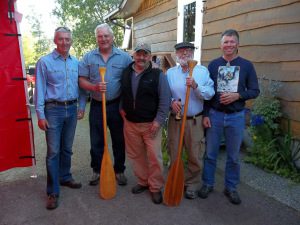
Photo of five of the six original participants on the first US/Canada Inter-Agency River Managers trip down the AlsekRiver in 1984. LtoR: Lloyd Freese, park warden retired, Jim Hannah US park ranger retired, Ron Chambers, park warden retired, Don Chase, US park superintendent retired, Rick Staley, park warden retired. http://parkwardenalumni.com/author/parkwarden/
On August 14th, 1999 a group of hunters discovered the remains of an ancient hunter at the edge of a remote glacier near the border between the Yukon and British Columbia. They found what turned out to be an ancient walking stick and other artifacts along with the body of a human being. The artifacts and remains were flown to Whitehorse for preservation. The find was of significance to both the Yukon government and the First Nations. Ron Chambers noted the discovery proves the long-term use of the land by First Nations people. Radio carbon dating indicated the artifacts to be 550 years BP (Before Present).
